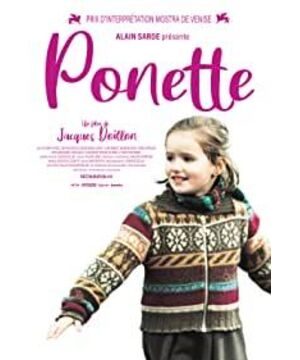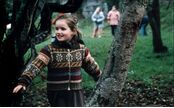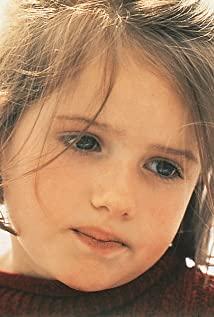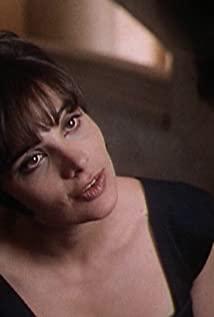This French film, filmed in 1996, was also translated as "Pity the Little Daughter of God" and "Bonet". The traumatized young children's psychology puts the cruel and realistic topic of how young children face death in front of the public, so that people with good fantasies have nowhere to run.
The cruelty is because, a 4-year-old girl who lost her mother in a car accident, Bonnett (Victoria Shiviso), understands the meaning of death, gives up the fantasy of praying for her mother's resurrection, and learns to make this thing for her. It's quite a cruel thing to have an apocalyptic event wiped from the scratches in the heart. The reality is because such tragic stories happen all the time. Thinking about the children who lost their parents in the "5.12" earthquake, it seems more special to talk about this old French film now.
The story structure of the film is very simple, the reproduction method is flat and straightforward, and the scenes are washed away. Even when discussing the shadow of death on the psychological level of children, it also adopts an extremely intuitive method. However, the group of young children in the film do not The embellished and authentic performances give this film a dazzling brilliance, and it also makes it flash with the temperament of a realistic documentary. The young star, Victoria Siweso, won the Best Actress Award at the Venice Film Festival for her role as Bonnet, becoming the youngest actress in film history. As for this actress, many people have criticized it, thinking that little Victoria should not know what acting is at that time. In fact, when filming, director Jacques Duvalon usually guides Victoria into the play in a game way, waiting for opportunities to capture her most natural and real moments during the game. It can be seen that behind the excellent and authentic performances of Victoria and other children, more is the painstaking management of the director and the main creators. But Jacques Duvalon doesn't think so, saying: "Children have intuitions of their own."
Regardless of whether a 4-year-old child knows how to act, the director's meticulousness and dedication can be seen everywhere in this film. Telling death from the perspective of a 4-year-old girl is far more shocking than using an adult. The direct expression also makes the performance of little Victoria Silveso almost integrated with the role. In the close-up, her tender little face is full of sadness and despair, and her big eyes are full of sadness and despair. mind. In order to see her mother again, Bonnett, who has only lived in the world for more than 1,460 days, worked hard in her own way: in the open space in the mountains, she used the "resurrection spell" of her little cousin Delphine to call her mother over and over again. , she even prepared gifts for seeing her mother again; in the prayer room of the kindergarten, she devoutly said her heartfelt words to Jesus, hoping that he could arrange for the mother and daughter to meet; "God's little daughter", in order to obtain this special status, she is willing to accept any test proposed by Ada; when the little boy Anthony refers to "bad boy" and says "because you are a bad boy, your mother died" , Bonnett was visibly poked, and she wept bitterly, and wrestled with Anthony; when she saw that all her efforts were in vain, the stubborn Bonnett went to the cemetery alone, and clasped her mother's grave with her little wounded hand. Many people burst into tears when they cried "Mom, I'm here"...
The ending of the film is meaningful, giving the film room for sublimation, and once again showing the director's good intentions ——Bonette, who felt cold, obtained a red coat from her dead mother (the shelter symbolizing maternal love is helping the little girl out of the haze). Mother's guilt, "...I didn't struggle, I passed away, but it was too cruel to you, I didn't care about you, I was too selfish...", "I have to try all kinds of things in life, I came back to make you promise , no more crying, no more sadness, afraid of life?" Bonnet replied: "No." "The earth is at your feet, try everything before you die, care about life... learn to be happy!" Whether this ending is too illusory or too beautiful, it is a necessary psychological rescue. Poor Bonnet finally accepts the reality that her mother will not come back. At the end of the film, she tells her father, "She will not come back again. , she wants me to learn to be happy!"
In addition, the beautiful, likable, and different children in the film have one thing in common, that is, they are all like "little adults" and like to talk about issues in the adult world. The differences involving "singleness and marriage", such as the daytime conversations between Delphine, Ada, and Bonnet about religion, all make people reassess the inner world of children.
Before becoming a director who is good at directing psychological dramas, Jacques Duvalon also worked as an editor and short film director. In 1974, after the great success of the independent film "Fingers in the Head", which described the psychology of adolescence, his name became more and more frequent. In 1979, he won the Cannes Film Festival Youth Film Award for the film "Little Girl", and in 1990, he won the Berlin Film Festival Special Jury Award for "Little Fugitive". And his other identity also makes him unable to be noticed. He is the current husband of Jane Birkin, the "Queen of Topics". In 1980, Jane Birkin was leaving the "slutty music genius" who was addicted to alcohol and couldn't extricate herself. Shortly after Serge Gainsbourg, he fell in love with Jacques Duvalon and got married. In 1982, he gave birth to a daughter, Lou Duvalon. It is said that this baby is also an unusual master. cause trouble.
In "Ponette", the audience can clearly perceive that the process of Ponette's adaptation and psychological adjustment to the loss of her mother was completed by herself alone, her father, relatives Not enough help from her teachers, especially the father who had to leave her in a hurry to go to work in Lyon. Fortunately, her little cousin Delphine and cousin Matthias were always by her side, even in the early days of the tragedy, Bonnet was not When they want to be in contact with people and are a little autistic, they always come to play with her. It can be seen that apart from expert intervention, being with children of similar age is also an important part of psychological intervention for traumatized children.
( http://nicolew.blog.hexun.com/19957814_d.html )
View more about Ponette reviews











